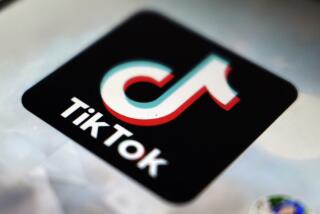Apple says no settlement talks with Qualcomm; San Diego federal judge sets trial date
A jury trial in Qualcomm Inc.’s wide-ranging legal war with Apple Inc. has been set to begin April 15 in San Diego federal court, with a settlement looking unlikely.
U.S. District Judge Gonzalo Curiel scheduled the trial at hearing Friday. Qualcomm had sought to begin the trial in February, but Curiel said the April date was needed to accommodate the court’s schedule.
He also noted that the complexity of the litigation and the prominence of the two tech giants would require more time.
Qualcomm Chief Executive Steve Mollenkopf told CNBC’s Jim Cramer this week that the San Diego cellular technology firm was “on the doorstep of finding a resolution” to the dispute with Apple.
Some news outlets took Mollenkopf’s statement to suggest that the two sides were in settlement talks, even though the chief executive made it clear in the past that a “resolution” would come from either a settlement or a verdict in court.
Apple attorney William Isaacson told Curiel on Friday that a settlement wasn’t in the cards.
“The parties are going to need a trial,” Isaacson said. “There have been unfortunate articles lately that the parties are close to a settlement, and that is not true. There haven’t been talks in months.”
Since early 2017, Qualcomm and Apple have been waging a legal war over royalties that Qualcomm charges for use of its patented cellular technology.
It has been a fierce fight. Apple instructed Asian contract manufacturers that build iPhones to stop paying royalties to Qualcomm, and it left out Qualcomm chips from its latest iPhone models.
Qualcomm has sought to ban iPhone imports in the U.S., Germany and China. It also has accused Apple of stealing trade secrets and supplying them to rival Intel.
Apple contends that Qualcomm has concocted a scheme that allows it to overcharge for patents in violation of patent, contract and antitrust laws. According to Apple, Qualcomm is getting paid twice for its intellectual property: once when it licenses its patent portfolio and a second time when it sells cellular modem chips.
Qualcomm says there is nothing illegal about its business practices. The company contends that not all of its 130,000 patents are encompassed on a cellular radio chip. It takes a systemwide approach to deliver fast wireless internet connections to smartphones, involving multiple components in phones and broader cellular networks. Its extensive patent portfolio covers these systemwide inventions.
A key battle is coming up early next year. The U.S. Federal Trade Commission has sued Qualcomm, claming antitrust violations along similar lines as the Apple lawsuit.
A trial in the FTC’s antitrust case is scheduled for Jan. 4 in U.S. District Court in San Jose. The outcome of that trial could play a role in the San Diego federal case. Qualcomm and the FTC both have said they are pursuing a settlement.
mike.freeman@sduniontribune.com
More to Read
Inside the business of entertainment
The Wide Shot brings you news, analysis and insights on everything from streaming wars to production — and what it all means for the future.
You may occasionally receive promotional content from the Los Angeles Times.











